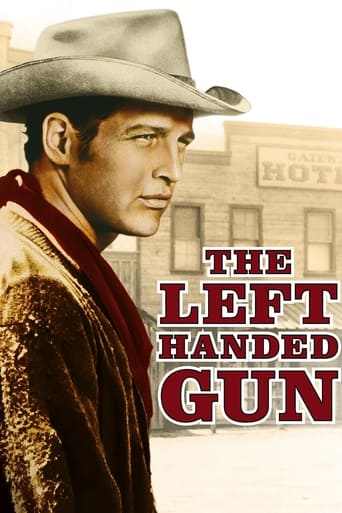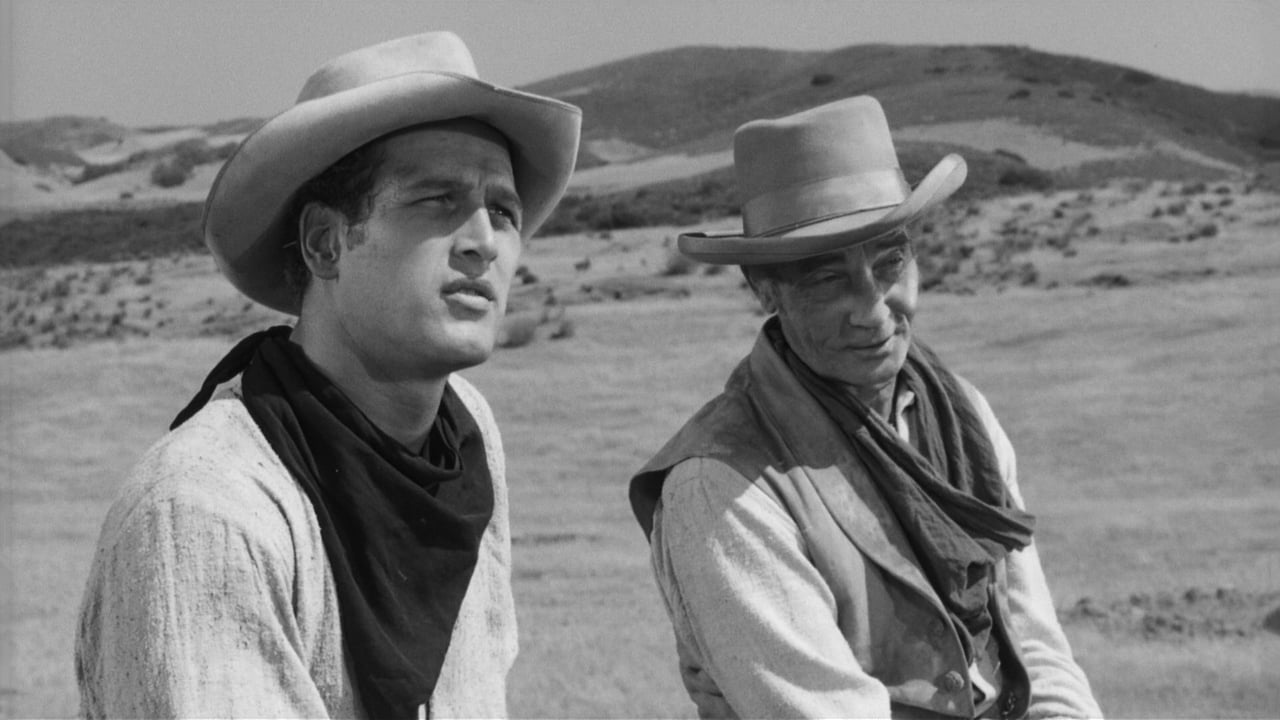CinePete
Arthur Penn's debut film was scorned in 1958, but has since gained recognition as a forerunner of the Revisionist Westerns that emerged in the 1960s.The original ad calls Billy a 'teenage desperado' and Penn's film gets the manic side to young Billy the Kid, wild at heart in a 1950s delinquent style, unrestrained, juvenile, engaged freely in bad boy antics, almost a clown. Billy is really the "Kid" in Penn's version - cast off from family and home, living with a "gang", as it were, losing his father figure (here, almost as soon as he meets him), then running loose and wild. The spirit of adolescence infuses the film's initial sections, but Billy becomes disillusioned quickly, and almost invites his own downfall without fully comprehending much of anything in the world around him.Surprisingly, as quoted in the movie, the Biblical phrase "through a glass darkly" comes to accurately suit the world-view of Billy - and several later Arthur Penn figures in the 1960s.His story as presented here (from an original television treatment by Gore Vidal) contradicts the dime-novel frontier legend that an eager writer (Hurd Hatfield) fabricates as the film goes along, manufacturing "fake news" for his own profit. Ideas are introduced into the Western that no one has yet dared to think about - the possibility of a gay frontier character in Hurd Hatfield's Moultrie, the links with James Dean's kind of 'angst', the macabre, almost comic nature of the sheer act of sudden dying. As will become significant in Penn's cinema, violent deaths here are prolonged, anguished, senseless; there is no clean, quick or merciful way of dying. Perhaps the French critics who praised the film were more attuned to the visually cinematic touches - anguish accentuated by close shot, rambling episodic structure, heightened treatment of violent acts, clash of horseplay with sudden deadly gunplay, the abrupt changes in mood and tone.Without a fully realized screenplay and with alleged studio interference (particularly noticeable in the ending sections), The Left-Handed Gun leaves us only partially satisfied, but still impressed by Penn's creative disregard for established conventions.Well worth a look for its times-they-are-a-changing attitude towards both the Western genre and America's founding myths.
disinterested_spectator
This is an uneven movie. It begins with Paul Newman playing Billy the Kid as a borderline simpleton who somehow acquires a normal intelligence by the end of the movie. The first half of the movie is manic, with Billy and his two sidekicks talking loud, acting silly, and laughing at things that are not funny, probably because they are drunk, but ends as some kind of overwrought, psychological melodrama. I think it's called Method Acting.This movie would have us believe that we are seeing a demythologized version of this character from the Old West, but it depicts all his killings as being justified, and when he is shot by Pat Garrett, he has no gun in his holster, so he really is not beaten to the draw, all in keeping with the traditional mythology.I have an idea. Why not make a movie in which Billy the Kid is an evil scumbag? That would be some serious demythologizing.
LeonLouisRicci
This Film has Many Interesting Elements that may Attract Viewers. Director Arthur Penn's Debut, Early Paul Newman as an Iconic Western Outlaw, and a Different Artistic Approach to the Conventional Western.However, the Movie is not the Easiest to Like. Penn's Flourishes are Welcome in a Genre so Ripe with Regularity, but Newman Overacts to the Point of Silliness and can Grate on the Nerves. In Fact, just about Every Actor Emotes to Extreme, Except Perhaps John Dehner as Pat Garrett who Strikes a Concerned Lawman's Pose Quite Well Without Words. But even He is Guilty of One Scene that is Downright Atrocious (the this is my wedding, this is my town part).Visually the Film has Many Interesting Shots and Flourishes, but Newman's Exaggeration of Body Language and Other Fanciful Displays that Misfire bring the Movie Down to just Above Average. There is Enough Curiosity here that is Worth a Watch, but Overall it is the Over Baked Acting that makes this a Disappointment.
Ilpo Hirvonen
Arthur Penn's directional debut is a revolutionist vision of the legend of Billy the Kid. In it he first approached a theme that would characterize all of his subsequent films: an alienated outsider who meets a hostile environment. The film is loosely based on the classical play by Gore Vidal and ethnologically it is extremely accurate but in the name of thematics and narrative Penn was very provocative. Paul Newman's performance, which he effortlessly achieved, lifted the film to a new level of emotional scales. He made it possible for the young people of the 1950's to identify themselves with the protagonist which was extremely important because as a historical film The Left Handed Gun is a portrayal of two times -- intentionally or unintentionally -- the time it takes place in and especially the time it was made in.It was a time of changes. The new generation was fed up with their parents' believes and their morality was constantly being questioned. In the 1950's history was observed differently, protests and revolutions took place, new sex symbols were born and plenty of new stars rose to fame, such as Elvis Presley, James Dean and Paul Newman. To this moment of transition Penn's film fits in more than well because it is also about change of habitat and life, alienation and trying to fit in.Already during the opening credits the protagonist is introduced to us. He's lost and alone, without a home or a goal. What is important is that he is not a murderer. He is a protector of family and friendship. He embraces the very same ideals the rest of us do. He has been driven to the life of crime and murder when he avenged his mother's death at the age of eleven -- his father died before he was born. Now seven years ago, in the story we follow, he avenges the death of his new 'father figure' an English drover. From him Billy picks up two lessons of life: firstly, a naive vision of good and evil, revenge and shame, secondly; the consciousness of the mysteries of life which are seen "through a glass darkly". However, Billy chooses the first and builds his upcoming life on it.The second alternative is a reference to the Bible: "For now we see through a glass, darkly; but then face to face: now I know in part; but then shall I know even as also I am known." (The First Epistle of Paul to the Corinthians, verse 12) The passage refers to the encounter with God when all the obstacles collapse. It refers to death —- the moment of perfection —- when man merges into his God. From this we are allowed to presume that this is how Billy sees the world. Although, he isn't aware of it; he lives his life by following the rules of the jungle. However, he actually sees the world as looking through a glass darkly. The murder of the English drover is a dark mystery and he refuses to see it as it is.The Left Handed Gun could be seen as a western edition of Rebel without a Cause since the protagonist thinks he is doing the right thing. What is the right thing to do is left ambiguous, and open for interpretation. Just as in East of Eden or Rebel without a Cause in this the morality of the elders is being questioned. But surely Billy's vision of morality isn't perfect. One can't observe life through dogmatism and absolute answers. There is no such thing as absolute morality and truth. In addition, just like other 'teenage' films of the 1950's so does this truly speak about isolation, anxiety and alienation. It's not just a story about the wild west but more of a story about the frustration and emotional lives of the youth of the 1950's.Having realized that the film is about teenage anxiety and alienation, we see how it ruthlessly breaks down the myth of the wild west from all its idealistic form -- and this is probably why it was received so badly when it first came to the theaters. The halo of heroism is torn apart as the heroic character of the wild west is truly nothing but a depressed lonely kid. All the brilliant scenes are characterized by ultimate fear of death. The scenes were Paul Newman cries, kneels down and begs are full of charge and lift the genre to a new level.The thesis of the film could simply be that: the society pushes those away who are most eager to achieve the sense of community it has to offer. So in reality Billy's alienation is born from his need for civilization which is constantly being taken away from him. The contradiction between an individual and the society is violent but not irreconcilable because the individual's move is towards the sense of community from alienation, not away from the society. However, Billy is not isolated just because of being and orphan and his inability to read but also because of his homosexuality which can be seen in all of his friendships and, it culminates in the end. This theme of homosexuality is from the play by Gore Vidal who, by the way, was openly a homosexual.The Left Handed Gun was extremely provocative and revolutionist. It's truly an unique film about social alienation and its consequences, anxiety and how it is the only "real" emotion (according to Freud), and how the world is always seen as through a glass darkly. Penn's world view is dark but realistic. Sure the film is not a masterpiece but, to my mind, it deserves more attention. Of course we can see the experimental and, at times, unstable direction of Arthur Penn but extraordinarily brilliant is the way how he was able to merge his thoughts, ideals and emotions into this particular story.



 AD
AD



